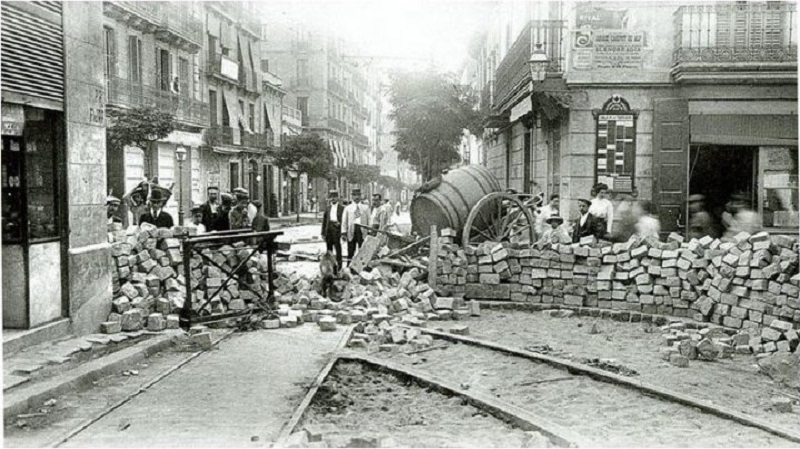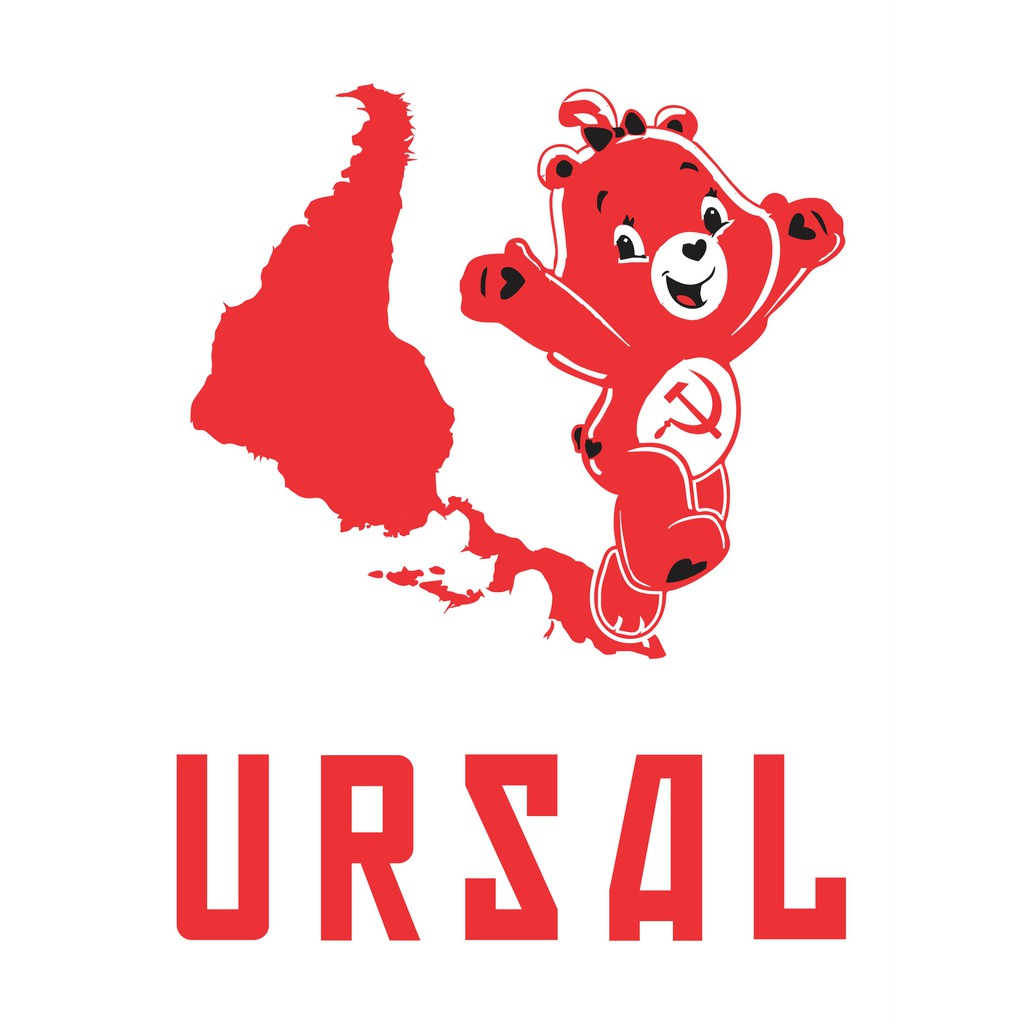On the 7th of january in 1919, the "Semana Trágica" began in Argentina when police attacked striking metalworkers in Buenos Aires, killing five, after workers set the police chief's car on fire. The city was quickly placed under martial law.
The "Semana Trágica" (Tragic Week in English, not to be confused with the Spanish Tragic Week) was the violent supression of a general workers' uprising, beginning with the attack on January 7th. In addition to the actions of the police and military, right-wing vigilantes launched pogroms against the city's Jews, many of whom were not involved, in order to suppress the rebellion.
The conflict began as a strike at the Vasena metal works, an English Argentine-owned plant in the suburbs of Buenos Aires. On January 7th, workers overturned and set fire to the car of the police chief Elpidio González. Militant workers also shot and killed the commander of the Army detachment protecting González. Following this, police attacked, killing five workers and wounding twenty more.
On the same day, maritime workers of the port of Buenos Aires voted in favor of a general strike for better hours and wages. After the police attack at Vasena, a waterfront strike began: all ship movements, and all loading and unloading, came to a halt.
Rioting soon spread throughout Buenos Aires, and workers battled with both state and right-wing paramilitary forces. Police utilized members of the far-right Argentine "Patriotic League", who targeted the city's working class Russian Jewish population, which they associated with the rebellion, beating and murdering many uninvolved civilians.
On the 11th, the city was placed under martial law, and the military restored control over the city over the next several days. Estimates of the death toll range from between 141 to over 700. The United States embassy reported that 1,500 people were killed in total, "mostly Russians and generally Jews"
La Semana Trágica - el historiador

Megathreads and spaces to hang out:
- ❤️ Come listen to music and Watch movies with your fellow Hexbears nerd, in Cy.tube
- 💖 Come talk in the New Weekly Queer thread
- 💛 Read and talk about a current topics in the News Megathread
- ⭐️ September Movie Nominations ⭐️
reminders:
- 💚 You nerds can join specific comms to see posts about all sorts of topics
- 💙 Hexbear’s algorithm prioritizes comments over upbears
- 💜 Sorting by new you nerd
- 🌈 If you ever want to make your own megathread, you can reserve a spot here nerd
- 🐶 Join the unofficial Hexbear-adjacent Mastodon instance toots.matapacos.dog
Links To Resources (Aid and Theory):
Aid:
Theory:



I was wondering, can a tribal confederacy ever be able to mobilise the resources required to industrialise at scale? Like, could the Pashtuns modernise Afghanistan without there necessarily being an Afghanistan nation-state to begin with?
I always thought the whole "afghanistan isn't a real nationstate" narrative was just the US gov't coping really hard about the fact that nobody wanted to work for their comprador government. Like how are ethnic relationship between Pashtuns and Tajiks any different than between White Americans and Hispanic Americans? It's not even rhetorical, I literally see the "they don't have a real national identity they mostly just identify with their tribe" argument used on Chinese sites against America the same way Americans use it against Afghanistan. IMO it's a stronger argument against America than against Afghanistan because at least in Afghanistan almost all the ethnic groups are Iranic language speakers who have been living alongside eachother for millennia.
I think it relies on defining the nation-state as a specific organizational technology. Nation-states are built on the idea that all the people within them are part of a single, mostly fictiousious, cultural and language group, and as such they all have shared interests and should be legally, economically, and militarily bound together. This is, of course, bullshit; It's all a ruse for the ruling classes to better control the proletariat and exploit the resources of the nation-state. The fictive ethno-national identity concocted and imposed by nation state projects isn't the same as more authentic ethnic and religious identities that evolve more naturally. Pashtunwali, the code of honor and hospitality by which many Pashtuns define themselves and their identities, arose from long standing custom and cultural evolution. It was not created the way nation-state cultural identities were deliberately created in Europe in the 19th centuries to collapse all the many cultures and languages of Europe in to a single national culture that was centrally controlled and defined and could be enforced by centralized government power. Afaik Pashtuns don't have any organ like the BBC that exists to normalize and reinforce a "British" culture. They don't have the equivalent of the French Academie that exists as a (technically, per international law) genocidal government organ tasked with exterminating peripheral French cultures and rigidly enforcing Parisian culture in every corner of France. Pashtun culture is defined, innovated on, and constantly recreated by Pashtun people doing Pashtunness.
This isn't better, please don't mistake me for doing the Noble Savage thing. I'm trying to highlight that the Nation State is a specific organizational technology that uses the deliberate creation of an ethno-national identity, a largely artificial identity built using historical revisionism and the violent destruction of competing or dissenting ethnic and linguistic groups, to build a centralized government authority which it's subjects will voluntarily buy in to, convinced that because they share a language and a culture they also share interests with the ruling class and/or bourgeoisie. It's goal is to streamline the process of subjugation by convincing random peasants that it's a good idea to go to another country, murder the indigenous people, and die in a miserable muddy hole in the ground "For the good of the nation" or some bullshit.
Whereas societies that came before or survive within and outside of nation states tend to lack that artificiality, the process of artifice, artifice being the creation of an artifact, a tool, and object. They arise and evolve from the day to day interactions between people and between adjacent societies and often lack the rigid, violently enforced physical borders of nation states, and the officially enforced linguistic and cultural norms.
America is an interesting contrast; Most Americans are extremely America-pilled on the idea that there is an America, it is a monolithic entity, and it has legitimacy. There are wildly diverging ideas on what that all means; Libs believe in the American Civic Religion. Fash believe in a divinely appointed and ruled white ethnostate predestined to dominate the world. But most of them are tied up in the unquestioning notion that they're all Americans, and that "American" means something. They define their enemies as not being real Americans. They're loyal to the organs of the state even when those organs are flagrantly and obviously hostile to them. They believe ridiculous things because the truth runs contrary to their beliefs about Americanness. It's the fictive Americanness, the largely false idea of a unified American culture, language, and ethnicity, that keeps the country from ripping itself apart under the massive force of it's internal contradictions. Americans are so convinced of their Americanness that they'll put up with unbelievable mountains of bullshit because they believe America is good and America is the best government and blah blah blah blah.
See, I think they do tend to be more loyal to their smaller tribal units (at least pre-Taliban) but can and do form larger tribal congregations that just never incarnated into a state. However, my view on the issue is informed more by my understanding of the Maratha Empire (which I’m quite familiar with) rather than the Afghans, so I could be patently wrong.
I got the impression that the Taliban was more or less an attempt to create a state, or something very like a state, with a unified set of religious beliefs in the post-Soviet era. I don't think there was necessarily much centralization of authority, but from what I understand (admittedly little), it was born out of a shared religious identity and shared beliefs. The pro-social elements, such as they are, specifically crushing the cultivation of opium and trying to stop heroin use, seem to have arisen from a genuine pro-social sentiment and a desire to help their fellow people and improve society.
Are you talking about right now or in an alternate history sense
I guess I’m looking at it historically, considering that the Taliban is far more centralised now.
Afaik this is a consistent phenomena - If you make war against nation-states, you will gradually become more and more like a nation state until one day you are a nation state.
Maybe? Idk because I don't think it's ever happened before, but I think nation-states might have arisen out of the specific context of Europe's fratricidal competition to rob and loot the rest of the world. And then nation-states spread, because thus far the only organizational technology that can hold off the predation of a nation state is another nation-state. Folks either developed their own nation-states or were overrun.
I guess my question would be - Could industrialization happen without the accumulation of capital, and if not, if accumulation of capital must necessarily happen alongside industrialization, would emerging capitalists inevitably create a nation-state to protect their capital?
The thing with industrialization - it creates extremely valuable capital that is not portable. Valuable resources that aren't portable generally need to be militarily defended. Nation states, with their central organization, bureaucracy, taxation systems, and broad legal authority to crush dissent and resistance, are well suited to maintaining standing armies and coercing recruitment in to armies during wartime. Soldiers within nation states are generally regarded as and treated like dogs, often in proportion to how often they're actually used; At least to my observation, the more soldier are actually used in combat operations the more poorly they're treated. Whereas in less militarized and less mercilessly authoritarian societies soldiers, or rather warriors, often hold a great deal of respect and occupy positions of political, moral, and spiritual authority. Which is to say; It's easy to bully the soldiers of a nation state in to guarding some shitty toxic mine in the ass end of nowhere, but less militarized societies with less violent central authority aren't likely to put up with that shit.
Likewise, industrialization, thus far, has required an oppressed and ruthlessly controlled proletariat, and a nation state is a good way to inflict proletarianization on people. Barring slavery, a less centralized and brutal society would not, I think, be able to enforce proletarianization.
I could see a situation where, in the absence of hostile nation state enemies, a society could proceed through industrialization in a slower, more considered, more pro-social way that didn't rely on so much brutality and violence to protect and expand capital, but that's not a situation that I think can occur in the world as it currently exists.
There's also the issue of markets - Afghanistan, as our example, would be competing with worldwide markets that are already industrialized, streamlined, optimized, integrated, and armed with both guns and lawyers. This puts it at a drastic disadvantage.
The societies that preceded the era of nation states certainly were capable of industry to the degree that the technologies were available - many kingdoms and city states had state industries that produced essential goods, or that controlled agricultural endeavors or major infrastructure. I think it's possible. But I don't think it could have happened in our world as history played out.